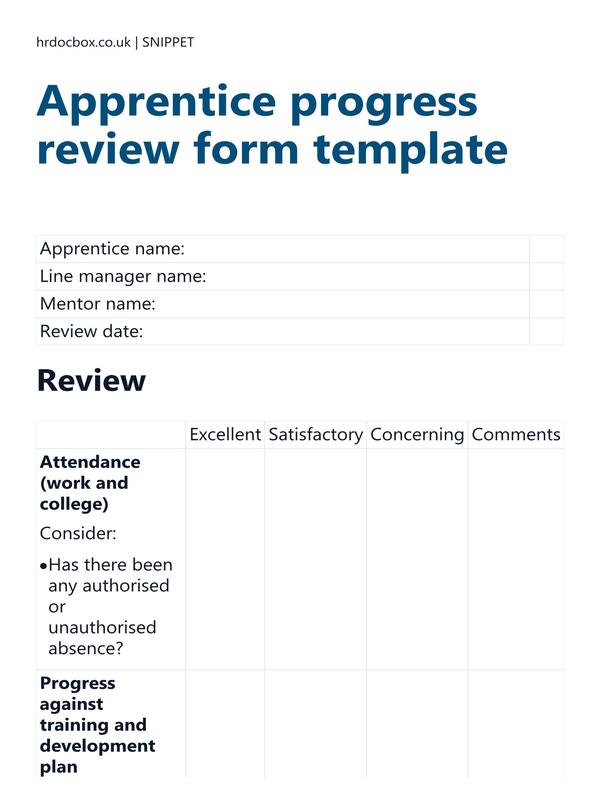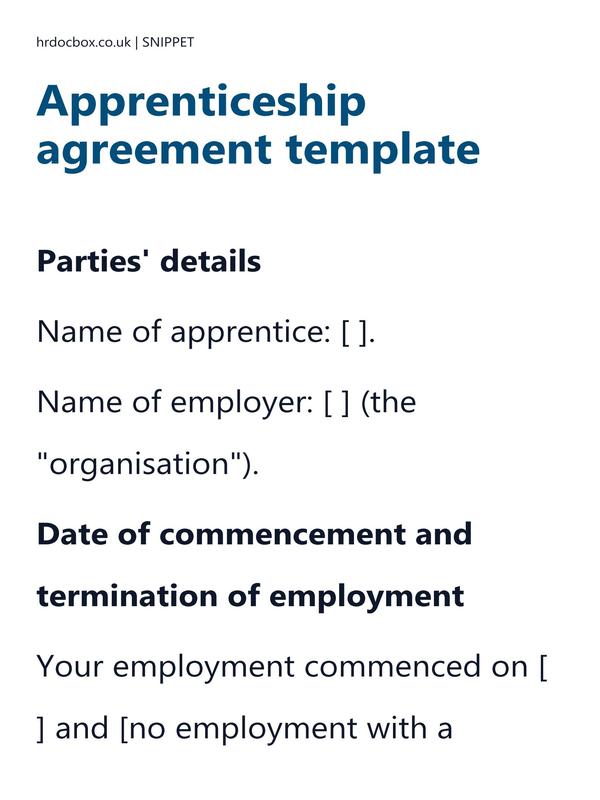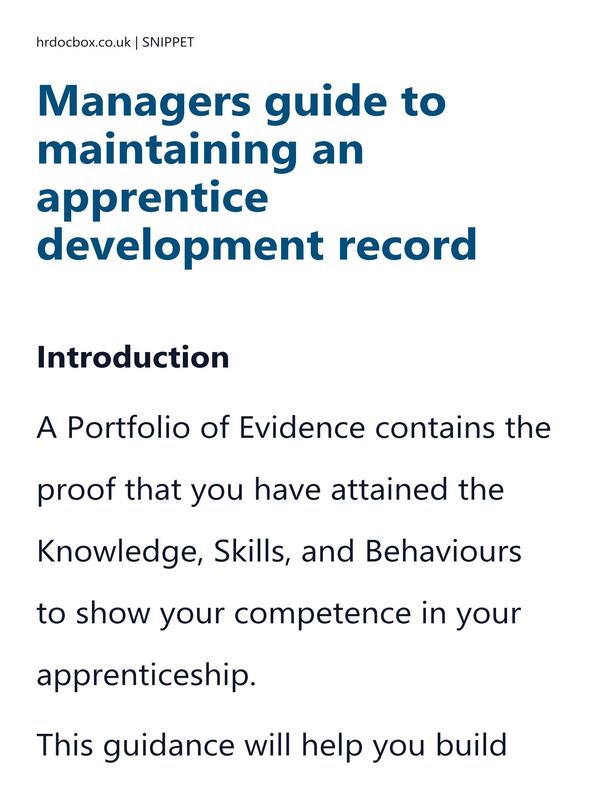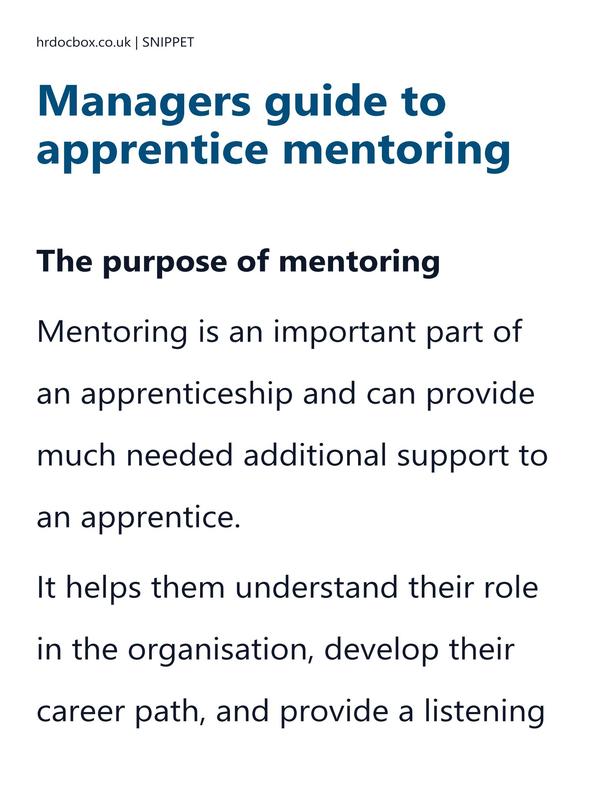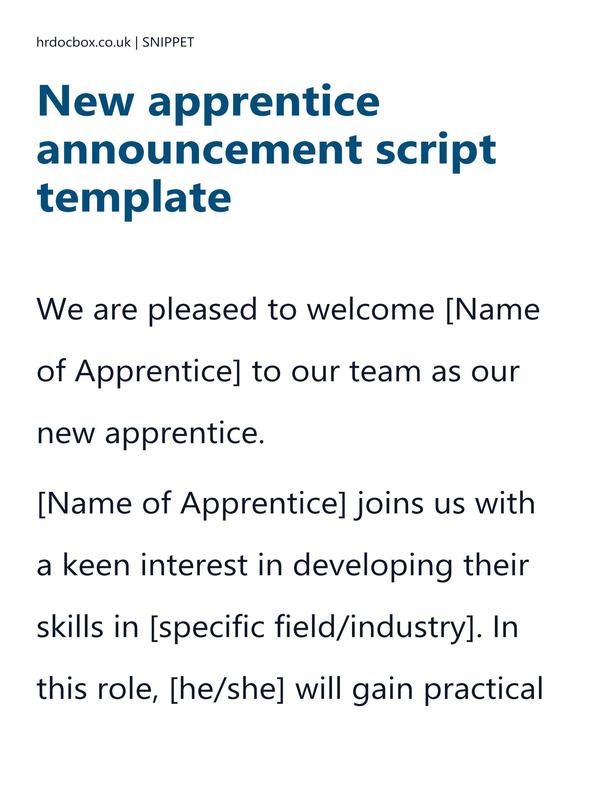Apprentice templates toolkit
Our Apprentice Templates Toolkit simplifies apprentice management, providing resources for successful onboarding and development.
Our toolkit includes a range of templates that are designed to simplify the process of managing apprenticeships, save you time and effort, and ensure compliance with all relevant apprenticeship legislation. From creating apprenticeship agreements to monitoring progress and assessing performance, our templates cover all the necessary documents required to manage apprenticeships effectively.
- Includes 12 months' access to 7 Apprentice templates, with all updates to the Apprentice templates toolkit provided free of charge and notified to you.
- UK-specific accuracy.
- Instantly download templates as Word / PDF / plain text, or send by email.
- These Apprentice templates toolkit will SAVE you up to 6 hours drafting & research, save you money, and reduce your risk.
Apprentice
An apprenticeship is a structured training program that combines on-the-job training with classroom instruction to provide individuals with the skills, knowledge, and experience needed to succeed in a particular trade or profession. It is a form of vocational education that allows individuals to earn a wage while learning and gaining hands-on experience in a specific industry or occupation.
Key features of apprenticeships include:
-
On-the-Job Training: Apprenticeships involve working under the supervision of experienced professionals or mentors within a real workplace environment. Apprentices learn practical skills and techniques directly applicable to their chosen trade or profession.
-
Classroom Instruction: In addition to on-the-job training, apprentices typically receive formal instruction through classroom-based learning, workshops, or online courses. This theoretical component complements hands-on experience and provides a broader understanding of relevant concepts, theories, and industry standards.
-
Structured Program: Apprenticeships are structured programs with defined learning objectives, milestones, and progression pathways. They often follow a curriculum or training plan developed by industry experts and regulatory bodies to ensure that apprentices acquire the necessary skills and competencies.
-
Earn While Learning: Apprentices receive a wage or stipend for their work during the training period. While apprentice wages may be lower than those of fully qualified workers, they allow individuals to support themselves financially while gaining valuable skills and experience.
-
Industry Certification: Upon successful completion of an apprenticeship program, apprentices may receive industry-recognised certifications, licenses, or qualifications that demonstrate their competence and readiness to work in their chosen field.
-
Job Placement: Apprenticeships often include provisions for job placement or employment opportunities with the sponsoring employer or within the broader industry upon completion of the program. Employers may choose to retain apprentices as full-time employees or help them secure positions with other companies in the industry.
Apprenticeships are commonly found in industries such as construction, manufacturing, healthcare, information technology, and skilled trades like plumbing, electrical work, and carpentry. They offer individuals an alternative pathway to traditional higher education and can lead to rewarding careers with opportunities for advancement and professional growth. Additionally, apprenticeships play a crucial role in addressing skills shortages, promoting workforce development, and strengthening the economy by providing businesses with a skilled and qualified workforce.
Apprentice templates are essential for managing a low-risk, compliant Apprentice process.
Compliance
Compliance
-
An apprentice is entitled to a written statement of particulars of employment.
-
An apprentice can be engaged under a traditional contract of apprenticeship or an approved apprenticeship agreement.
-
A good induction programme is vital for an apprenticeship to be successful; an apprentice may have very little experience of the workplace, so a thorough induction can make a lot of difference. A good induction can help an apprentice understand their role and how it fits into the team.
-
An apprentice may have little idea of what's expected in the workplace so set clear expectations from the start. A clear understanding of what tasks they have to carry out and to what standard will help an apprentice greatly. Setting clear expectations for your apprentice can help avoid performance problems later on. Review progress with your apprentice on a regular basis to ensure they are developing and learning as they should.
-
Give the apprentice plenty of feedback about what they're doing, both formal and informal. Lots of informal immediate positive feedback can have enormous benefits for your apprentice.
-
Good pastoral support is essential for a successful apprenticeship especially if the apprentice is very young. Appointing a good mentor for your apprentice can improve their experience and make the apprenticeship more successful. Consider providing your apprentice with support outside the line management structure by using a buddy system.
Apprentice workflow
Apprentice workflow
Here we show you which resources to use to effectively create an apprenticeship program, taking into account the different decisions and directions that are likely / possible.
Following this flowchart will ensure that you factor in all eventualities, follow legal / code of conduct or best practice processes, communicate effectively, and reduce the risk of things going wrong.
Frequently Asked Questions about Apprentice templates
Frequently Asked Questions about Apprentice templates
-
Can small businesses use these Apprentice templates?
Yes. The Apprentice templates in this toolkit are designed to be flexible and suitable for organisations of all sizes, including small businesses and charities. They follow UK employment law best practice, so even if you don't have an in-house HR team, you can confidently manage Apprentice processes and issues.
-
Are these Apprentice templates up to date for UK law in 2026?
Absolutely. All templates are drafted with the latest ACAS guidance and UK employment legislation in mind. We review and update them regularly, so you can be confident they remain compliant.
-
What types of Apprentice letters and documents are included?
Every toolkit includes a complete set of editable templates, supporting documents, and manager guidance designed to save time and ensure compliance.
-
How will this help me as an HR manager or business owner?
Purchasing the toolkit saves you hours of drafting time and reduces the risk of legal mistakes. Instead of starting from scratch, you'll have clear, professional templates that you can adapt to your business.
-
Do I get instant access to the templates?
Yes. Once purchased, you'll be able to download the Apprentice toolkit instantly. The templates are provided in editable Word or Excel format so you can customise them easily, and PDF format for easy sharing.
-
Can I preview a sample Apprentice template before buying?
We provide free examples of our templates here. This gives you a sense of the quality and layout before you commit to purchasing the full toolkit.
-
What if I need a full HR toolkit, not just Apprentice templates?
If you're looking for broader support, we also offer library bundles that include Apprentice templates along with absence, grievance, and other HR policies. These may be more cost-effective if you need a complete HR library.
-
Why should I use these templates, and not AI to generate them?
The risk of using free AI-generated templates 'without review' includes your legal exposure, missing context, and no awareness of the wider process. Purchasing from us mitigates that risk.


